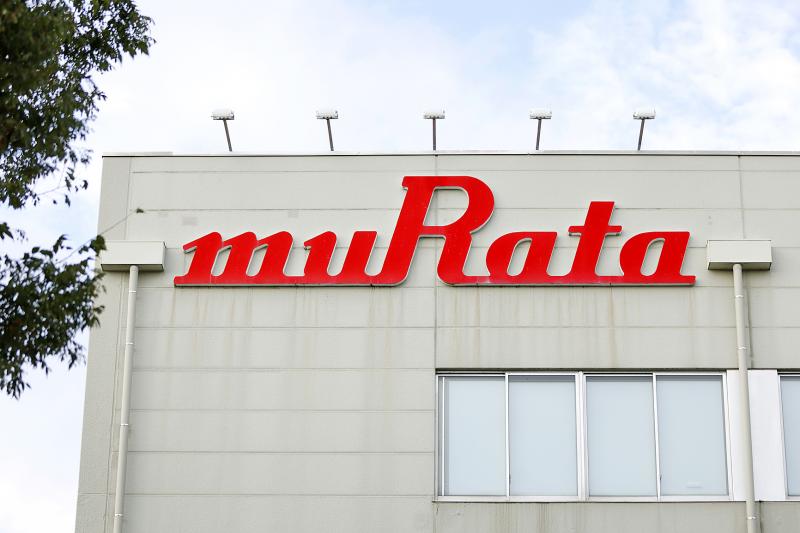Multilayer ceramic capacitor (MLCC) manufacturer Murata Manufacturing Co’s decision to suspend some production lines at a key plant in Japan to fight a COVID-19 cluster infection there could lead to order transfers for high-end products, but the short-term revenue benefits for Taiwanese firms would be limited, Capital Investment Management Corp (群益投顧) said yesterday.
“We believe that the effect of order transfers remains to be seen, as the first quarter is a low season for consumer passive components in the Greater China region and the demand is weak,” Capital Investment wrote in a note.
“However, the demand for high-end products used in automotive and industrial control applications is still good, and there is a possibility of order transfers,” it said.

Photo: Bloomberg
Murata, the world’s largest supplier of MLCCs, which are used in smartphones, computers, vehicles and other consumer electronics, on Saturday confirmed that several employees at Fukui Murata Manufacturing Co’s Takefu factory in Echizen city had tested positive for COVID-19, the Nikkei Shimbun and Kyodo News reported.
The firm has suspended some operations at the Takefu factory, as more than 100 COVID-19 cases have been confirmed and about 1,200 of the factory’s 7,000 workers are quarantined, the reports said.
During the last cluster infection at the Takefu factory in August last year, all production lines were suspended.
Taipei-based TrendForce Corp (集邦科技) said in a report yesterday that only some categories of production capacity have been reduced or suspended at the Takefu factory.
The Takefu factory accounts for 20.7 percent of the company’s production capacity, which mainly focuses on high-end consumer MLCCs, TrendForce said.
“The current production reduction or suspension of some items will affect the supply of products such as servers and high-end smartphones,” it said in the report. “Fortunately, Fukui Takefu still retains 4 to 6 weeks of inventory and this incident should not tighten market supply in the short term.”
As soon as the Murata news broke, there was speculation that Yageo Corp (國巨), the world’s third-largest MLCC supplier, Walsin Technology Corp (華新科技) and other Taiwanese passive component suppliers might benefit from order transfers, as it is not known when the Takefu factory will resume full operations.
However, based on past MLCC factory lockdowns in Southeast Asia amid the COVID-19 pandemic, order transfers had not been obvious, Capital Investment said.
“While Yageo’s high-end product line is expected to benefit from any potential order transfers, the revenue effect would be limited in the short term, as the company’s current delivery time of high-end products for automotive and industrial control products is above six months,” Capital Investment said.
Yageo reported consolidated revenue of NT$106.54 billion (US$3.86 billion) for last year, up 57.49 percent from NT$67.65 billion in 2020, while Walsin’s revenue totaled NT$42.09 billion last year, an increase of 18.41 percent from NT$35.54 billion a year earlier, company data showed last week.
Yageo shares yesterday rose as much as 3.19 percent in Taipei trading, before paring gains to close 0.2 percent higher at NT$502, Taiwan Stock Exchange data showed.
Walsin shares closed 0.32 percent higher at NT$157.5, off a high of NT$163.

South Korea’s equity benchmark yesterday crossed a new milestone just a month after surpassing the once-unthinkable 5,000 mark as surging global memory demand powers the country’s biggest chipmakers. The KOSPI advanced as much as 2.6 percent to a record 6,123, with Samsung Electronics Co and SK Hynix Inc each gaining more than 2 percent. With the benchmark now up 45 percent this year, South Korea’s stock market capitalization has also moved past France’s, following last month’s overtaking of Germany’s. Long overlooked by foreign funds, despite being undervalued, South Korean stocks have now emerged as clear winners in the global market. The so-called “artificial intelligence

NEW IDENTITY: Known for its software, India has expanded into hardware, with its semiconductor industry growing from US$38bn in 2023 to US$45bn to US$50bn India on Saturday inaugurated its first semiconductor assembly and test facility, a milestone in the government’s push to reduce dependence on foreign chipmakers and stake a claim in a sector dominated by China. Indian Prime Minister Narendra Modi opened US firm Micron Technology Inc’s semiconductor assembly, test and packaging unit in his home state of Gujarat, hailing the “dawn of a new era” for India’s technology ambitions. “When young Indians look back in the future, they will see this decade as the turning point in our tech future,” Modi told the event, which was broadcast on his YouTube channel. The plant would convert

‘SEISMIC SHIFT’: The researcher forecast there would be about 1.1 billion mobile shipments this year, down from 1.26 billion the prior year and erasing years of gains The global smartphone market is expected to contract 12.9 percent this year due to the unprecedented memorychip shortage, marking “a crisis like no other,” researcher International Data Corp (IDC) said. The new forecast, a dramatic revision down from earlier estimates, gives the latest accounting of the ongoing memory crunch that is affecting every corner of the electronics industry. The demand for advanced memory to power artificial intelligence (AI) tasks has drained global supply until well into next year and jeopardizes the business model of many smartphone makers. IDC forecast about 1.1 billion mobile shipments this year, down from 1.26 billion the prior

People stand in a Pokemon store in Tokyo on Thursday. One of the world highest-grossing franchises is celebrated its 30th anniversary yesterday.